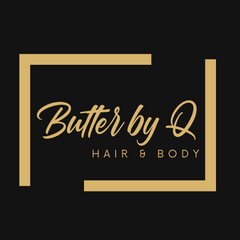The Worst and Best Oils for Low Porosity Hair (And Bonus Tips)
Table of Contents
- What Is Low-Porosity Hair?
- Why Is the Right Oil Important for Low-Porosity Hair?
- Why Should You Choose Oils with Low Porosity Hair?
- What Are the Best Oils for Low Porosity Hair?
- Is Jojoba Oil Good for Low Porosity Hair?
- Is Rosehip Oil Good for Low Porosity Hair?
- Is Avocado Oil Good for Low Porosity Hair?
- Is Apricot Oil Beneficial for Low Porosity Hair?
- What Are the Worst Hair Oils for Low Porosity Hair?
- What’s the Best Ways to Apply Oils to Low Porosity Hair?

Understanding whether you have high or low-porosity hair is critical to your hair journey. While everyone is obsessed with curl patterns, your hair's porosity is more important. Let’s explore low-porosity hair and the worst and best oils for nourishing it and promoting healthy growth.
Experience the Butter by Q Effect
If you’re looking for the best oil for low-porosity hair, Butter by Q Itch-Away Moisturizing Serum is a multi-dimensional, nutrient-enhanced oil designed to nourish your scalp, penetrate tightly bound hair cuticles, and promote healthier, thicker hair growth. See the results for yourself. 
What Is Low Porosity Hair?

High-porosity hair is very porous, allowing moisture to easily pass through hair shafts. In contrast, low-porosity hair has tightly bound, overlapping cuticles that lay flat. While low-porosity hair retains moisture well, the tightly bound cuticles make it harder to moisturize. Failure to use an effective regimen can cause your hair to be dry, brittle, and more prone to product buildup.
Low-Porosity Hair Characteristics
Low-porosity hair is not very absorbent and allows less water to pass in or out of your hair. Here are a few low-porosity hair characteristics:
- Low-porosity hair tends to take much longer to dry.
- Products can build up on the hair shaft instead of being absorbed.
- Your hair takes much longer to become saturated when wet.
- Your hair may feel brittle and dry.
Why Is Hair Porosity Important?
Understanding whether you have high, medium, or low porosity hair is critical to your journey. The texture of your hair determines lifestyle choices and the tools you use, such as how often you should wash it. Hair porosity determines the products you use and how often you use them.
Why Is the Right Oil Important for Low-Porosity Hair?

Nutrient-filled oils can help improve the integrity of your strands, scalp, and overall hair appearance.
Oils Help Improve Strand Integrity
Oils act as a protective barrier for your hair, preventing damage from external factors like pollution and heat. It creates a protective shield around hair shafts to limit the likelihood of breakage while strengthening and adding resilience to strands.
Oils Nourish Your Scalp to Promote Hair Growth
Oils also act as scalp nourishment and food, creating the optimum environment for healthy hair growth. The best hair oils stimulate blood circulation and prompt hair follicles to yield new strands.
Oils Infuse Life into Dull Hair
Good low-porosity hair oils can also add a beautiful luster to your hair, smooth down cuticles, and reflect light, offering your locks a shinier, more lustrous appearance. If you struggle with dull hair, the right oil can unlock the glowy, radiant, vibrant hair you desire. However, all oils are not for all types of hair, especially if you have low-porosity hair.
Why Should You Choose Oils with Low Porosity Hair?
If you have low porosity hair, look for lightweight haircare products that can navigate past the tightly bound cuticle and nourish strands. Utilizing the right products in the Liquid (L), Cream ( C), Oil (Oil) method can do just that! The LCO method involves washing and rinsing your hair (liquid), applying a cream layer of whipped hair butter, and then using Butter by Q's Moisturizing Serum to seal the hydration in your strands.
- The L or liquid hydrates hair shafts.
- The C or cream adds a layer of moisture to the hair shaft.
- The O or oil seals the moisture into your hair.
If you have low-porosity hair and use the cream last, it can lead to product buildup because the cream will fail to penetrate your hair follicles. Instead, the product will sit atop the strands. The LCO method is perfect for low-porosity hair because it bolsters the chances of moisture penetration.
What Are the Best Oils for Low Porosity Hair?

Three key attributes to look for in a low-porosity hair oil include:
- Lightweight and easily absorbed
- High hydration and moisturization properties
- Full of nutrients and vitamins
Avoid Heavier Oils with Low Porosity Hair
Heavier oils will weigh your hair down, lead to product buildup, and leave your hair greasy. Thinner oils are more likely to penetrate the tightly closed cuticles of your hair.
Choose Low Porosity Hair Oils with Moisturizing Properties
Because low-porosity hair needs moisture to thrive and grow, choose oils that offer additional hydrating properties.
Opt for Nutrient-Filled, Low-Porosity Hair Oils
Finally, make sure you consider the nutrient content of the oil. The best oils for low-porosity hair are rich in antioxidants, minerals, and vitamins. These nutrients are the building blocks to healthy growth. Nutrient-rich oils help soften your hair and reduce the risk of breakage.
Is Jojoba Oil Good for Low Porosity Hair?

Recognized as the gold standard oil for low-porosity hair, jojoba oil can work magic for your tightly closed cuticles. It resembles the natural sebum produced by your scalp, which makes it easily absorbed by your hair. Jojoba oil is non-greasy, lightweight, and a perfect conditioner that will not weigh your hair down. It's loaded tight with valuable nutrients — such as Vitamins B, C, E, copper, and zinc —that help:
- Moisturize your hair
- Soothe your scalp
- Stimulate hair growth
- Limit dandruff
- Prevent premature graying
- Control frizz
- Protect the scalp from infections
- Treat heat damage
Is Rosehip Oil Good for Low Porosity Hair?

Rosehip oil has been used for centuries by Egyptians and Native Americans. Today, rosehip oil is one of the premier oils for low-porosity hair and your scalp. It offers a healthy dose of fatty acids, antioxidants, polyphenols, and vitamins C, A, and E. Polyphenols and vitamin E are anti-inflammatories that can reduce discomfort and scalp irritation.
Rosehip oil also includes phytonutrients that help prevent cell damage from free radicals and promote better long-term health of your scalp. With antifungal, antioxidant, and antimicrobial effects, rosehip oil is one of the top low-porosity hair oils:
- Promotes hair growth
- Increases hair shine
- Bolsters hair elasticity
- Soothes irritated scalps
- Manages dandruff flakes
- Makes your hair look fuller
Is Avocado Oil Good for Low Porosity Hair?

While avocado oil is heavier than jojoba, rosehip, and apricot oil, it's lightweight and ideal for low-porosity hair. Avocado oil can deeply penetrate your hair strands and deliver action-packed molecules of nutrients. It contains natural fatty acids that help repair and restore damaged hair cuticles while preventing further breakage.
Avocado oil is infused with Omega-3 fatty acids and many other nutrients and vitamins, such as vitamins A, B, C, D, E, iron, and zinc. A few benefits of rosehip oil include:
- Reduces dandruff
- Nourishes and strengthens hair
- Protects and repairs hair follicles
- Promotes healthy hair growth
- Softens and smooths hair
- Prevents breakage
Is Apricot Oil Beneficial for Low Porosity Hair?

Apricot kernel oil is a highly nutritious, quick-absorbing, lightweight oil the perfect solution for low-porosity hair. Apricot kernel oil boasts ample fatty acids and several hair-enhancing vitamins, such as:
- Vitamins A, C, and E
- Calcium
- Copper
- Iron
- Magnesium
- And more
These nutrients work together to prevent and reduce hair loss, control dandruff, moisturize your scalp, and stimulate healthy hair growth. In addition, apricot oil helps:
- Moisturize hair
- Strengthen strands
- Improve luster and shine
- Improve scalp health
- Soften hair
- Improve hair texture
What Are the Worst Hair Oils for Low Porosity Hair?

There are several oils you should avoid if you have low-porosity hair. Here are some of the worst oils for low-porosity hair
Coconut Oil Isn’t Ideal for Low-Porosity Hair

Coconut oil is not good for low-porosity hair. Even though coconut oil is widely touted for its benefits, its large molecules make it difficult for low-porosity hair to absorb. Because of this, coconut oil tends to sit on the surface of low-porosity hair, leading to a greasy product build-up.
Avoid Olive Oil If You Have Low Porosity Hair

Olive oil is another wildly popular oil, especially in the Black and African American communities. But much like petroleum-based grease, olive oil may not be ideal for people with low porosity hair. Regularly using olive oil on low-porosity hair can cause your hair to be weighted down and be less responsive to styling.
Castor Oil Isn’t Ideal for Low Porosity Hair

Another popular hair oil in the Black community is castor oil. While some swear by it, castor oil isn't suitable for all hair, especially low-porosity hair. Castor oil is thick and is too heavy for low-porosity hair. Because this thick oil may not penetrate the cuticle layer of your hair, it creates a barrier that prevents the natural hydration process instead of promoting moisture retention.
Avoid Mineral Oil If You Have Low Porosity Hair

Mineral oil is a petroleum-derived product commonly used in hair because of its ability to form a barrier on the hair shaft. It’s typically used to adulterate hair oils to reduce costs. However, petroleum-derived products like mineral oil often do more harm than good. The mineral oil barrier prevents moisture from entering your hair, expediting breakage and dryness. You should avoid mineral oil in hair care products — no matter your porosity.
What’s the Best Ways to Apply Oils to Low Porosity Hair?

Now that you know the best and worst low-porosity hair oils, it’s vital to optimize their effectiveness with proper application. Here are a few tips and ways customers use our lightweight Moisturizing Serum for low-porosity hair.
Using Moisturizing Oil as a Pre-Poo

Pre-poo treatment involves applying the Itch-Away Moisturizing Serum to your hair before shampooing. This protects your hair from the drying effects of shampooing. When using the oil as a pre-poo, apply it from root to tip and leave it on for a minimum of 30 minutes.
Deep Condition Your Low Porosity Hair with Lightweight Oils
Nourishing and hydrating low-porosity hair is achieved through deep conditioning with oils. Following shampooing, generously apply oil to damp hair, paying attention to the ends and dry sections. Wrap your hair with a shower cap or towel and allow the oil to work its magic for approximately 30 minutes, utilizing the natural heat from your scalp to facilitate penetration into the hair shaft. Rinse the oil and use a conditioner to seal the moisture.
Seal in Moisture with Oil in the LCO Method

After washing and conditioning your hair, it's crucial to seal in moisture with lightweight oils. Using a suitable oil for low-porosity hair as the last step in the LCO method can lock in moisture and nutrients.
Massage Your Scalp, Warm the Oil, and Wrap It UP
To maximize the benefits of the oil, gently massage it into your scalp. Massaging your scalp can help stimulate blood flow and promote hair growth. You can also lightly warm up the oil to increase absorption. Finally, after you apply the oil, cover your hair with a warm towel or shower cap to gently open your hair cuticles and bolster absorption.
Get All 4 Lightweight Low-Porosity Hair Oils in One with Butter by Q’s Itch-Away Moisturizing Serum

If you have low porosity hair, our Itch-Away Moisturizing Serum is the premier solution. It includes best-in-class ingredients — such as jojoba, rosehip, avocado, apricot, and other nutrients — to deliver best-in-class results. Learn more about our Itch-Away Moisturizing Serum

